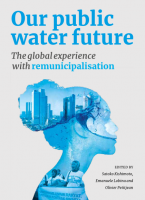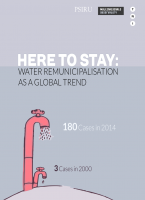Consolidation of the public water movement in Spain Outcome of the first meeting CITIES FOR PUBLIC WATER
Topics
Regions
The first CITIES FOR PUBLIC WATER MEETING took place on 3rd and 4th November, 2016 in Madrid, convened by La Red Agua Pública/the Public Water network in collaboration with the Municipal Council of Madrid. The event can be considered a milestone in the public water movement as it has strengthened the alliance of different actors involved in the defence of the public management of water, from a perspective of common good and human rights and will permit a closer collaboration with municipal councils and other public institutions (universities, professional colleges, cultural entities, etc.) in the future.
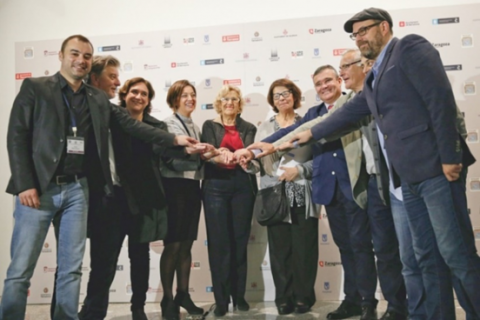
La Red Agua Pública
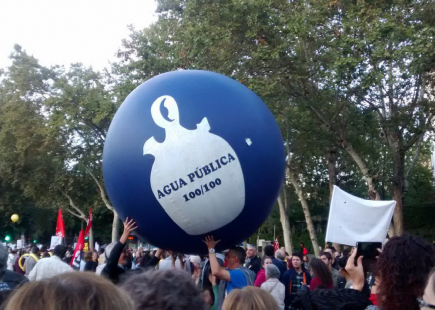
Red Agua Pública
Three-hundred people (mayors, councillors, operators, social activists, professionals, people from the academic world and citizens interested in water services) met to exchange experiences and initiatives for the recovery of the public management of water, to analyse the potential and challenges of the re-municipalisation process, the implementation of new models of democratic and participatory management, the effective application of the human right to water and the implementation of shared collaboration strategies between social organisations and municipal councils. The main result of the event was a proposal to constitute a NETWORK OF CITIES FOR PUBLIC WATER as a collaboration instrument involving all actors interested in ensuring the public and democratic management of water and sanitation services. This network was supported by the mayors who participated in the round table to close the event.
We will report on the most important issues that were debated, the declaration signed by the mayors who participated in the event and its conclusions. For more information, the speeches, presentations and a video of the entire event will be published on La Red Agua Pública and Madrid Municipal Council web pages.
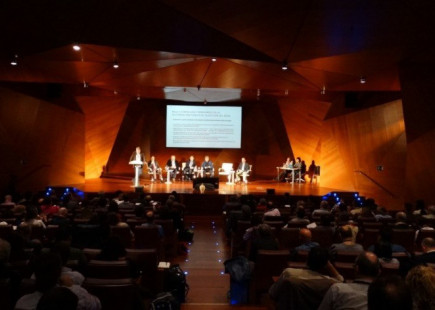
Red Agua Pública
THE ISSUES UP FOR DEBATE
The discussions were preceded by an inaugural paper given by Jaime Morell (general secretary of AEOPAS- Spanish Association of Public Water and Sanitation Operators) that addressed the technical, social and financial challenges in the public management of water. Five discussion panels were then formed.
The first table dealt with THE RECOVERY OF PUBLIC WATER MANAGEMENT and analysed the global trend of re-municipalisation, its progress in the Spanish State and a series of national and international experiences, highlighting the case of the creation of Eau de Paris.
The speakers were: Celia Blauel (deputy mayor of París and president of Eau de Paris), Emanuele Lobina (researcher from Public Services International Research Unit, PSIRU), Luis Babiano (manager of the AEOPAS- Spanish Association of Public Water and Sanitation Operators), Rafael Prieto (general director of Canal de Isabel II Gestión- public water company in Madrid), Albert Testart (manager of the the Integral Water Management of Catalonia Consortium, CONGIAC) and María Sanchez (councillor of the Municipal Council of Valladolid). The moderator was José Antonio Diaz Lázaro-Carrasco (coordinator of the Environment and Transport Area in the Municipal Council of Madrid).
The second discussion focused on PRIVATIZATIONS AND SOCIAL MOBILIZATION, which analysed citizen mobilisations against the privatisation of water in Europe and Spain, focusing on specific cases such as the Alcázar de San Juan, Jerez de la Frontera and Terrassa. Speakers included: Renato di Nicola (Movimiento Europeo del Agua in Italy), Fernando Ruiz de Osma (Plataforma contra la privatización de Alcázar de San Juan, Spain), Sonia Giménez (Taula del Aigua de Terrassa, Catalonia), Manuel Bertolet (Coordinadora del Agua de Jérez) and Enrique Ortega (Plataforma contra la Privatización del CYII). The discussion was moderated by Miriam Planas (Aigua es Vida).
The third table was about WATER, MANAGEMENT MODEL AND DEMOCRACY and debated the impact of the European citizen initiative on Right2Water and democratic and participatory management models, environmental sustainability in those models and the implementation of the human right to water, focusing on the cases of Córdoba and Medina Sidonia, which remunicipalise water services in 2003. Speakers included: Pablo Sánchez (coordinator of the European Water Initiative), Annette Jantzen (Aqua Publica Europea), Miguel Ángel Alzamora (Red Agua Pública), Lucía Soriano (Fundación Nueva Cultura del Agua -FNCA-), Arturo Gómez (sub-director of the Empresa Municipal de Aguas de Córdoba S.A. (EMACSA) , public water company in Córdoba) and Santiago Gutiérrez (manager of Medina Global, municipally-owned multi-utility company in Medina Sidonia). The debate was moderated by Pedro J. Linares (Comisiones Obreras –CC.OO.–).
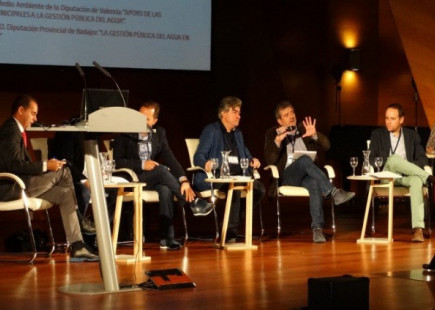
This fourth discussion addressed the foundation to constitute the NETWORK OF CITIES FOR PUBLIC WATER, analysing existing experiences at an international level and in Spain, focusing on the cases of Asturias, Madrid and Aragon. A proposal was debated regarding the purpose and objectives of the network, its possible organisation and its implementation. Speakers included: Meera Karunananthan (Council of Canadians), Liliana Pineda (Red Agua Pública), Lis Aguirre (Plataforma contra la Privatización del CYII), Joaquín García (Red Agua Pública de Aragón) and Fernando Díaz (Plataforma por la Defensa del Agua Pública del Asturias). The discussion was moderated by Juancho Santana (councillor from Majadahonda).
The final discussion debated the STRENGTHS AND WEAKNESSES IN THE PUBLIC RECOVERY OF WATER MANAGEMENT and analysed the different aspects that influence the re-municipalisation process: political, social, legal, administrative, financial and labour related. Participants also considered the possibilities offered by supra-municipal institutions in support of water management, in particular in small populations, focussing on two successful experiences: the Deputation of Valencia and the Environmental Management Consortium in the Provincial Deputation of Badajoz (PROMEDIO). Speakers included: Lucas Perea (Empresa Metropolitana de Abastecimiento y Saneamiento de Aguas de Sevilla S.A. –EMASESA–), Eulalio Ávila (former president of the Local Government Secretaries, Auditors and Treasurers –COSITAL-), José Manual Martínez (vice-secretary of the Municipal Council of Valladolid), Josep Bort (environmental delegate from the Valencia Deputation) and Álvaro Jiménez (director of PROMEDIO). The discussion was moderated by Leandro del Moral (University of Sevilla).
THE MUNICIPAL WAGER FOR PUBLIC WATER
This part of the event had two phases: In the first René Revol, mayor of Grabels and president of the Montpellier Metropolitan Area Water and Sanitation Service described the experience of one of the most interesting re-municipalisation processes that has taken place in France and where a very advanced management model has been adopted.
Subsequently there was a round table discussion with mayors from the Spanish state which was attended by: Ada Colau (Barcelona), Inés Sabanés (representing the mayor of Madrid), Joan Ribó (Valencia), Pedro Santisteve (Zaragoza), María Isabel Ambrosio (Córdoba), Óscar Puente (Valladolid), Xulio Ferreiro (A Coruña), Jordi Ballart (Terrassa), Martiño Noriega (Santiago de Compostela) and Guillermo Hita (Arganda del Rey), president of the Federation of Muncipalities of Madrid. The discussion was moderated by Rita Maestre (councillor and municipal council spokesperson for Madrid).
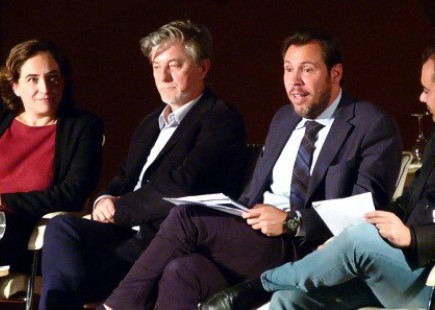
The mayors explained the water services management situation and the actions they are carrying out in their respective municipalities in defence of the 100 percent public management of these services in a transparent, participatory manner that ensures the human right to water. Finally, Inés Sabanés reach a declaration signed by the participating mayors, the text of which is as follows. The text was distributed in Castellano, Catalan and Euskera.
DECLARATION FOR THE PUBLIC MANAGEMENT OF WATER
The mayors who are present in the Meeting of Cities for Public Water, held in Madrid on 3rd and 4th November 2016, manifest our commitment to the public, transparent, participatory and sustainable management of the integral water cycle and we commit to ensuring the following principles as well as the fulfilment of any commitments deriving from them to guarantee their real and effective implementation.
1. We believe that water and its associated ecosystems are a common good that cannot be appropriated for the benefit of private interest. All of nature’s good and resources form part of the natural patrimony of the planet and are indispensable for the sustainment of life, which obligates us to preserve and protect them. We therefore defend that they be managed with criteria of solidarity, environmental sustainability, mutual cooperation, collective access, equity and democratic control, without contemplating profit.
2. We fully assume that the provision of water for human consumption and sanitation is a human right which, in accordance with the doctrinal body of the United Nations, is indispensable for a dignified life and a precondition for the realization of other fundamental rights. As a result, supplies must be provided on a universal basis, guaranteeing a vital minimum for all people and ensuring that any supply cuts for economic or social reasons are prohibited.
3. We understand that the management of supply and sanitation services must, in addition to being necessarily public, promote new forms of social control that guarantee transparency, information, accountability and effective citizen participation. As a result we are committed to a management model in which the public entity responsible for these services accounts for their activities and actions, both to public authorities and citizens, and that, both in day-to-day management, in planning and in decision making process, instruments of citizen participation are established in the services, linked to the urban water cycle, promoting the necessary consensus.
4. As a result, we reject the privatisation of the integral urban water cycle services and we support the re-municipalisation processes that are being carried out in numerous cities and towns to recover the public, democratic and transparent management of water to guarantee a rendering of accounts to the citizens.
5. We assume that the Local Administrations have the responsibility to adopt opportune decisions to ensure the sustainability of the integral urban cycle, according to the European Water Framework Directive in the environmental, economic, social, structural spheres and in management. We will provide the necessary means so that, from public management, services are provided that meet the most demanding standards of quality and efficiency, guaranteeing a public management with citizen participation.
6. We support the constitution of the Network of Cities for Public Water which, through a horizontal management model involving all actors interested in the integral water cycle (public officials, public operators, social organisations, experts, citizens) permits access to information and knowledge, placing in common all existing problems and experiences that have been carried out as well as proposed activities of common interest.
Madrid, November 4, 2016
Manuela Carmena, mayor of Madrid; Ada Colau, mayor of Barcelona; Joan Ribó, mayor of Valencia; Pedro Santisteve, mayor of Zaragoza; María Isabel Ambrosio, mayor of Córdoba; Oscar Puente, mayor of Valladolid; Xulio Ferreiro, mayor of A Coruña; Jordi Ballart, mayor of Terrassa; Martiño Noriega, mayor of Santiago de Compostela; Guillermo Hita, mayor of Arganda del Rey.
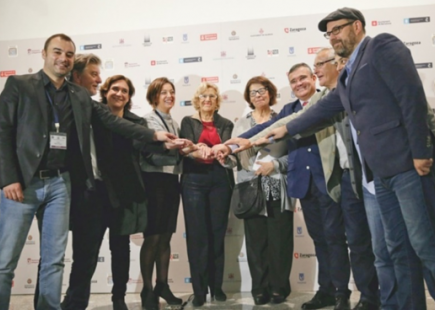
La Red Agua Pública
THE CONCLUSIONS OF THE EVENT
The general conclusions were presented by Enrique Gracia and Julia Martinez, in the name of Red Agua Pública and were as follows:
• The management of the integrated water cycle faces a series of technical, social, environmental and economic challenges that need to be addressed in a coordinated and collaborative way among citizen associations and organisations, operators, institutions and governments. Its objective should be to develop a sustainable water policy focussed on the common and human right to water, understood as a right to a provision of water supply and sanitation services that must be guaranteed by the public administration.
• Therefore, public operators must assume the general, normative and specific criteria of the human right to water and sanitation in terms of equity and the universal nature of the service and must ensure that supply is never cut to homes that are socially vulnerable, guaranteeing a vital minimum to cover personal and domestic needs under this right.
• The citizen struggle against the privatisation of water services has contributed a very relevant experience manifested in the need for mobilisation, collaboration and mutual support, democratic and transparent decision making, reflection, alternatives and the generation of local, regions, national and international networks.
• This is the struggle that is addressed in the local, national and international arena, in the cities and the countries but also in Brussels where directives and trade agreements are formalised that create the framework for privatisation policies or essentially impede the recovery of privatised services. Examples of this are the formation of local platforms such as the case of Alcázar de San Juan, Medina Sidonia or Jerez – regional platforms such like Andaluucía, Aragón, Astuarias, Catalunya, Madrid or Murcia, national platforms such as La Red Agua Pública and international network such as the European Citizen Initiative Right2Water and the European Water Movement.
• There is a growing global trend toward the re-municipalisation of water supply services and in the past 15 years 235 cases have been identified that are motivated by different causes, including corruption, lack of transparency, low quality services, the unsustainable lift in rates. However, these processes are not exempt from difficulty (labour, legal, financial challenges etc.), nor from pressure on the part of private interest that try to create obstacles if not paralyse them definitively such as cases like Valladolid or Terrassa at this moment, Paris in the past among others.
• However, returning water supply to public management is only the first step; it is fundamental that management models are implemented that guarantee citizen and democratic control, transparency and a rendering of accounts. There are examples to be taken into account such as public water operator EMASCA in Cordoba or Eau de Paris, which works with citizen-led platform the Paris Water Observatory. There is a proposed model in the Social Pact for Water, driven by Red Agua Pública, which has served as a reference to articulate struggles in many territories.
• The management models must guarantee the conservation of the good ecological state of water bodies, with innovative and flexible technologies that contribute to ensuring sustainability over the long term.
• In this struggle, the need to drive legislative actions and initiatives has also been manifested as it is fundamental to have the support and coordination of local administrations and those responsible for water services, in the defence of the public management of water. This raises the need to form a stable network between the citizens –the user of the supply and sanitation service– and local administrators, which are responsible for them. As a result, the aim is to constitute the Network of Cities for Public Water that connects all social sectors interested in the public and democratic management of water.
THE CLOSING OF THE EVENT
The event was closed at 15.00 h, with the intervention of Maria Jiménez (Red Agua Pública) and Inés Sabanés (Municipal Council of Madrid).
-
Outcome of the first meeting CITIES FOR PUBLIC WATER (PDF, 1.65 MB)Average time to read: 10 minutes
-
ENCUENTRO DE CIUDADES POR EL AGUA PÚBLICA (PDF, 1.9 MB)Average time to read: 10 minutes
